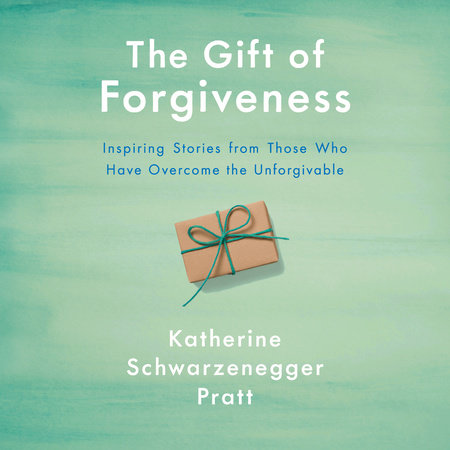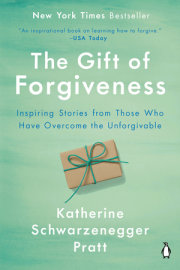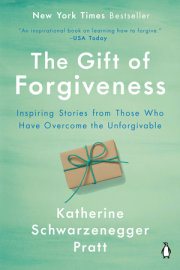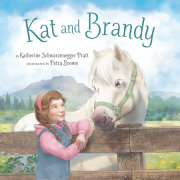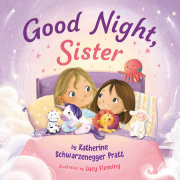Elizabeth Smart
Innocence Reclaimed
"Forgiveness is the answer to the child's dream of a miracle by which what is broken is made whole again, what is soiled is again made clean."
-Dag Hammarskjšld
In June 2002, when she was fourteen years old, Elizabeth Smart was kidnapped from her bedroom in Salt Lake City, Utah. She spent nine months in captivity, during which her captors-a husband and wife-tied her up, raped her daily, and threatened to kill her family if she made any attempts to escape. In March 2003, she was rescued by police officers and returned to her family. Such an ordeal would leave many of us in a permanent state of rage, but, incredibly, not Elizabeth. Shortly after her release, she made the decision to forgive her captors for all the horrible things they had done to her-and to move forward with her life.
Forgiveness did not come instantly; it was a process. Like many, Elizabeth grew up with the idea that forgiveness was something simple, something she had learned on the playground: "When someone pushes you down, you're the bigger person when you say, 'It's okay. We can stay friends.'" When she returned home after being rescued, she still thought of forgiveness in this way. It took time for her to realize that forgiveness is not a gift you give to others; it's something you do for yourself-while also not excusing what happened to you. The horrible acts committed against her were in no way justifiable, but she discovered that she could accept her past in order to reclaim her future.
It wasn't until Elizabeth was trying to reacclimate to everyday life that she realized her childhood version of forgiveness no longer served her. She realized something crucial: "Forgiveness is not necessarily a two-way street. It's a very personal thing, and you don't need two people for forgiveness to happen." She learned that at the heart of forgiveness is compassion: compassion for the person who harmed you and, more importantly, compassion for yourself. As she told me, "It's loving myself. It's allowing myself to feel whatever emotions I feel and to deal with them. And if it's anger, you know what? I think that is just fine."
When Elizabeth first returned home, her mother told her that she should try her best not to relive her ordeal. Her captors had already taken so much from her; allowing them to maintain their grip on her by revisiting her captivity would be giving them too much control. She knew that staying angry at her captors wouldn't make any difference to them-it wouldn't punish them or erase any of the harm they had caused her. It would only trap her in her own cycle of trauma and rage. For her, holding on to this anger meant that she would never be fully happy: "I'd never be able to enjoy my life." Only once she recognized what was important to her-reclaiming her life-was she able to let go of that anger.
Despite all she went through, Elizabeth was still able to find reasons to be grateful. She pointed out that many kidnappings are committed by someone the victim knows. She told me, "I actually feel so lucky that I was kidnapped and abused by strangers, because most people who have experienced similar things know their captors. For me, I didn't have to have relationships with them. They were out of my life, so that made it much easier." Recognizing such glimmers of light, even in her darkest hours, has helped her on her journey forward.
While Elizabeth has chosen a path of forgiveness toward her captors, she admits that she still has moments when she struggles. She says it's normal for her anger or sadness to overwhelm her at times. "When you have those moments when you feel like you are falling back into anger or sadness," she told me, "allow yourself to feel those feelings, and then love yourself enough to let them go and to try to embrace your life moving forward." She advises people in similar situations to take their time. Working through these feelings is something that everyone must do at their own pace. Beating yourself up about still feeling those emotions only makes moving on even harder. Elizabeth suggests that recovery starts with acceptance: "Accepting that you're angry, accepting that you're hurt, accepting that something traumatic has happened to you. Then I would recommend doing your very best to start loving yourself. Don't even think about forgiveness at that moment. Just try to start loving yourself. I think as your love for yourself grows, you will be able to let go of what's happened to you."
To help strengthen her inner resolve, Elizabeth surrounds herself with supportive people-her friends and, above all, her family-who have helped her through her process of forgiveness and renewed her strength during her moments of backsliding. Setting goals for herself and relying on this network of positive people have helped her stay on track, especially when she experiences "emotional potholes" that might otherwise set her back. "I do everything I can to fill my life with the positive emotions, positive people, positive activities."
Surrounding herself with love also means distancing herself from people who might drag her backward. Her former captors have no role in her recovery. As she explains, "I didn't want to live my life under my captors' control, whether they were standing next to me or a hundred miles away locked up in prison. I did not want to live my life in fear, and I didn't want to feel like I had to be scared about everything and everyone." For Elizabeth, it was clear: dwelling on her captors would only hold her back, and she wasn't going to sacrifice her future for a past she could not change.
About a year after she had been rescued, Elizabeth was asked if she had forgiven her captors. She vividly remembers searching for an authentic response. "I felt like I had this sort of epiphany of what I felt true forgiveness was, and I remember feeling like, 'Yeah, I have moved on. I have let it go. I have forgiven.'" Her epiphany was that forgiveness is an act of self-love. Holding on to a traumatic past does nothing but consume your present emotional space. She has come to understand that "just loving yourself and giving yourself the freedom to live your life fully" is the key to moving on. Her understanding of forgiveness came "with growth and experience, and listening to other survivors, and going through a process of introspection that finally enabled me to articulate it."
Elizabeth's ability to move on was tested again when it was announced that her female captor, who was scheduled to get out of jail in 2024, would be released early, in September 2018. Although it was an incredibly stressful time, her forgiveness wasn't shaken; the self-love she worked so diligently to maintain over the years held firm. And the key to her remarkable strength is the love she has for herself. "I feel like I have a pretty good relationship with myself, and I'm proud of the person who I've become. I mean, I'm certainly not perfect . . . I definitely have plenty of flaws that I need to work on. But I like who I am."
When I first heard Elizabeth speak about forgiveness, I thought to myself, "How could she forgive two people who caused her so much pain and changed the course of her life?" But hearing how she was able to put aside the horrors she faced and instead focus on healing herself showed me that forgiveness starts, first and foremost, with you. Being kind to yourself, and allowing yourself to live the full life you deserve, is the first step to moving on. Elizabeth's journey through darkness teaches us all that forgiveness is truly an act of self-love.
Chris Williams
A Collision of Worlds
"That he that cannot forgive others breaks the bridge over which he must pass himself, for every man hath need to be forgiven."
-Edward Herbert, 1st Baron Herbert of Cherbury
On the evening of February 9, 2007, Chris Williams went out for dessert with his wife and their three youngest children. Within the hour, his life would be changed forever. As he and his family drove back home, Chris recalls seeing a car speeding down the hill, coming directly toward them. He tried to swerve out of the way, but they were struck with tremendous force by the oncoming car. He recalls hearing the deafening sound of the impact. Once the car had come to a stop, there was a deadly silence. As he looked over at his motionless wife in the passenger seat, he knew she was gone. He struggled to turn around to see if his children in the backseat were okay. He looked at his son and daughter, both not moving, and knew in that instant that they, too, were both gone. While he couldn't see his other son, he had a feeling that he was going to be okay. As he turned back to the front of the car, he looked at his lifeless wife, pregnant with their unborn child. He was numb with shock, unable to process what had just happened. He closed his eyes, feeling helpless and hopeless; the pain was unimaginable, and he wished he could die, too. Then he opened his eyes and saw the other car that had just hit him. He was suddenly overcome by a strange sense of peace. Despite the horror of the moment, he already knew that he would forgive the other driver.
While many of us would find it impossible to forgive someone who has taken so much from us, Chris knew that he had a choice to make. He recalls, "The one thing that nobody can take away is our ability to decide how we react to those situations. Was I going to go down the path that I knew wouldn't give me justice, wouldn't give me closure, wouldn't bring my family back? If anything, that path could actually poison the remaining family that I had with anger and vengeance. Or could I make a choice to let all of that go and choose to be healed in another way?"
Just as Chris had his own way of coping with the tragedy, so did the people around him. His mother had a very difficult time moving on from the sudden loss of her grandchildren and daughter-in-law. Right after the accident, he says his mother was unable to forgive. "She wanted vengeance. Whenever there was a parole hearing, she wanted me there, though I would never go." Chris's mother had to feel what it was like not to let it go. She learned that, for her, withholding forgiveness "starts to destroy you, it starts to eat you up. She finally realized, 'This is not for me, I can't do this.'" People often hold on to anger, thinking it will somehow heal their pain. Realizing that doing so just leaves them stuck in the midst of the trauma, unable to heal-that's when they turn to the only hope left for them: forgiveness. Being able to extend compassion despite suffering and loss has helped Chris cope with his pain. Holding on to anger is like keeping the wound fresh and open; you never give it the chance to heal.
Choosing the path of forgiveness gave Chris and his family peace. It also helped restore the life of the young man who had been driving the other car. His name was Cameron. For Chris, forgiveness was the only choice that would allow him to reclaim his life. He knew that seeking revenge would leave him locked in a never-ending cycle of anger and resentment. "Going down a path of anger or vengeance or desire for retribution-there's no happy ending down that path. It may make me feel good for a while, but it doesn't bring the people back. It doesn't make the pain and anguish go away. It just feeds into a poisoned atmosphere of anger and injustice."
Forgiveness wasn't easy. It was a constant struggle. As Chris describes it, "I found that this desire to let it go was like a battle, minute by minute. I'd say to myself, 'If I could do this for five more minutes, and then the next five . . .' Over time, it became a little easier to do. Gradually, I developed a greater ability to let it go. It's like an athlete getting better at the sport they're practicing." The ability to forgive gets easier as time goes by and you have a chance to develop what Chris calls "your forgiveness muscle."
Chris sees forgiveness not as an obligation, but as a gift: "I believe it's the greatest gift you can give yourself. It's your ability to regain control when you experience something that seems to take every choice away from you. It's an opportunity to feel relief when you might be in the most horrific pain. The person who forgives ultimately gets 100 percent of the benefit."
Forgiveness also helped restore the life of the driver of the other car. He says he always wanted what was best for Cameron, the young man who'd caused the accident. Amazingly, Cameron's health and well-being were always on Chris's mind, from the moment they were rushed into the emergency room. Chris remembers being in the ER and repeatedly asking about Cameron's status, even as he struggled with his own anguish. "Whenever I felt angry or sad, I didn't want to direct it at him, because that would bring him back into my life. What I wanted was the ability to go through those emotions, as powerful as they are, with my family and my friends and my loved ones." By channeling his grief away from its source and toward the support of his family and friends, Chris was able to let go of the trauma and deepen the bonds with the people he loved the most.
The secret to Chris's extraordinary ability to forgive lies in a burden that he has carried throughout his life-one that he knew Cameron would have to carry, too. When Chris was sixteen years old, he was driving to work one morning when he struck a young boy who had run out into the street. The boy was taken to the hospital. After clinging to life for several days, the boy died. Although there was nothing he could have done to prevent the accident, Chris has been tormented by the boy's death ever since. The boy's family was kind toward Chris after the accident, even writing him a letter attempting to relieve him of his guilt. Despite their understanding, Chris still suffered from the guilt of having taken a life. Decades later, when he lost his own family, he instantly felt empathy for Cameron. He knew that he and Cameron would now struggle beneath twin burdens: Chris would carry the grief of losing his wife and children, and Cameron would carry the guilt of having cut those lives short. But from the beginning, Chris found solace in empathy. Their shared burden became a bond between Chris and Cameron that helped each heal as they moved forward.
Copyright © 2020 by Katherine Schwarzenegger. All rights reserved. No part of this excerpt may be reproduced or reprinted without permission in writing from the publisher.

